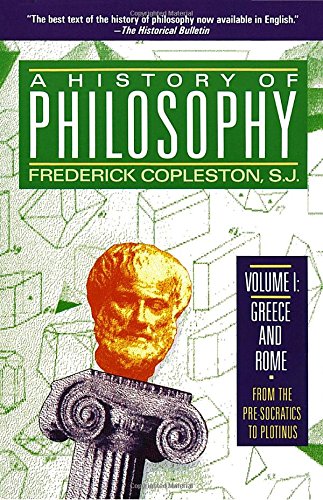
Ebook Info
- Published: 1993
- Number of pages: 544 pages
- Format: PDF
- File Size: 9.77 MB
- Authors: Frederick Copleston
Description
Conceived originally as a serious presentation of the development of philosophy for Catholic seminary students, Frederick Copleston’s nine-volume A History Of Philosophy has journeyed far beyond the modest purpose of its author to universal acclaim as the best history of philosophy in English.Copleston, an Oxford Jesuit of immense erudition who once tangled with A. J. Ayer in a fabled debate about the existence of God and the possibility of metaphysics, knew that seminary students were fed a woefully inadequate diet of theses and proofs, and that their familiarity with most of history’s great thinkers was reduced to simplistic caricatures. Copleston set out to redress the wrong by writing a complete history of Western philosophy, one crackling with incident and intellectual excitement — and one that gives full place to each thinker, presenting his thought in a beautifully rounded manner and showing his links to those who went before and to those who came after him. The result of Copleston’s prodigious labors is a history of philosophy that is unlikely ever to be surpassed. Thought magazine summed up the general agreement among scholars and students alike when it reviewed Copleston’s A History of Philosophy as “broad-minded and objective, comprehensive and scholarly, unified and well proportioned… We cannot recommend [it] too highly.”
User’s Reviews
Editorial Reviews: From the Publisher Conceived originally as a serious presentation of the development of philosophy for Catholic seminary students, Frederick Copleston’s nine-volume A History Of Philosophy has journeyed far beyond the modest purpose of its author to universal acclaim as the best history of philosophy in English. Copleston, an Oxford Jesuit of immense erudition who once tangled with A. J. Ayer in a fabled debate about the existence of God and the possibility of metaphysics, knew that seminary students were fed a woefully inadequate diet of theses and proofs, and that their familiarity with most of history’s great thinkers was reduced to simplistic caricatures. Copleston set out to redress the wrong by writing a complete history of Western philosophy, one crackling with incident and intellectual excitement — and one that gives full place to each thinker, presenting his thought in a beautifully rounded manner and showing his links to those who went before and to those who came after him. From the Inside Flap Conceived originally as a serious presentation of the development of philosophy for Catholic seminary students, Frederick Copleston’s nine-volume “A History Of Philosophy has journeyed far beyond the modest purpose of its author to universal acclaim as the best history of philosophy in English. Copleston, an Oxford Jesuit of immense erudition who once tangled with A. J. Ayer in a fabled debate about the existence of God and the possibility of metaphysics, knew that seminary students were fed a woefully inadequate diet of theses and proofs, and that their familiarity with most of history’s great thinkers was reduced to simplistic caricatures. Copleston set out to redress the wrong by writing a complete history of Western philosophy, one crackling with incident and intellectual excitement — and one that gives full place to each thinker, presenting his thought in a beautifully rounded manner and showing his links to those who went before and to those who came after him. About the Author Frederick Copleston grew up in England (1907-1994). He was raised in an Anglican home but converted to Catholicism while a student at Marlborough College. He later became a Jesuit and then pursued a career in academia. He studied and lectured at Heythrop College and wrote an eleven-volume History of Philosophy, which is highly respected. He also spent time teaching at Gregorian University in Rome and, after he retired, lectured at Santa Clara University in California. He was appointed a member of the British Academy in 1970. He is famouse for debating Betrand Russell over the existence of God in a 1948 BBC broadcast. Read more
Reviews from Amazon users which were colected at the time this book was published on the website:
⭐The volume is “the first volume of a complete history of philosophy”. (p.v) Although to “mention a “point of view” at all, when treating of the history of philosophy, may occasion a certain lifting of eyebrows” (p. v), the author has “no hesitation in claiming the right to compose a work on the history of philosophy from the standpoint of the Scholastic philosopher”(p. vi) as “no true historian can write without some point of view, some standpoint, if for no other reason than that he must have a principle of selection, guiding his intelligent choice and arrangement of facts.” (p. v) Scholastic philosophers study philosophy as the “philosophia perennis”. (p. 2)Modern philosophers, especially since René Descartes (A.D. 1596 – A.D. 1650) and Immanuel Kant (A.D. 1724- A.D. 1804), divorce thought from reality and start like Descartes from Consciousness, from the fact that man has innate ideas in his mind.This is not the starting-point of Copleston and others who study philosophy as the perennial philosophy. They start from Being, not from Consciousness, and for them it is reality which imposes its structures on the mind, not like Kant, the mind imposing its structures on reality.This perennial philosophy has been outlined by Plato (428 B.C. – 348 B.C.) and Aristotle (384 B.C. – 322 B.C.) and elaborated by St. Thomas Aquinas (c. A.D. 1225 – A.D. 1274). For Copleston, perennial philosophy is Thomism in a wide sense. The Thomist system is however not closed at any given historical epoch and incapable of further development in any direction. (p. 7)Most intellectuals today, on the one hand, view Plato as interested in ideas and Aristotle as interested in things and they maintain, on the other hand, that Plato separated the Form from the objects of which it is the Form, whereas Aristotle argued that to the universal in the mind, there corresponds the specific essence in the object.Plato’s and Aristotle’s philosophies are therefore diametrically opposed, they say, some even going so far as to label Plato as a neo-Kantian. Copleston demonstrates that Plato is not a neo-Kantian. Copleston concludes that Platonism and Aristotelianism “should not be considered as two diametrically opposed systems, but as two complementary philosophical spirits and bodies of doctrine.” (Volume I, p. 275) After having argued that a synthesis between the Platonic Theory of Forms and the Aristotelian view of the universal was needed (Volume I, p. 203), Copleston will demonstrate in Volume II how St. Thomas Aquinas achieved this synthesis and harmonised the synthesis with Christian theology. This is why, as mentioned earlier, for Copleston, perennial philosophy is Thomism in a wide sense. This also explains why for Copleston, the first three volumes of his History – Greece and Rome, Medieval Philosophy, and, Late Medieval and Renaissance Philosophy – form only one volume, why Volume III ends with “A Brief Review of the First Three Volumes” and why this review cannot but contain references to Volumes II and III.A quick review of the history of Western thought will suffice to bear out the constant presence of Plato’s and Aristotle’s philosophies. In philosophy and in everyday life, the questions “What do you mean?” and “How do you know?” will be constantly present. It was therefore important to demonstrate that there is no contradiction between the Platonic and Aristotelian bases of the principles we need to answer these questions, Aristotle’s principle of non-contradiction saying that the same attribute cannot at the same time belong and not belong to the same subject and in the same respect. This is Copleston’s achievement in the present Volume I, which therefore also contains its own “Concluding Review”.Copleston will conclude the final volume of his History, Volume XI, by saying that, for him, the problem of God is THE metaphysical problem par excellence. One can criticise this conclusion but one should also recognise that the argument is consistent with one of the conclusions of the present Volume I wherein Copleston argues that Greek philosophy was a preparatory intellectual instrument for Christianity, a “preparatio evangelica.” (Volume I, p.502).In his own critique of the present Volume I, Copleston writes on p. 408 of Volume III of the History that he does “not think … that one is justified in interpreting the pre-Socratics as nothing more than speculative forerunners of science.” (Volume III, p. 408)Many readers complain about the quotations in languages other than English. Those readers seem to forget that the book is not “An Introduction to Philosophy” but “A History of Philosophy”. They also seem to forget that in the present Internet age, search engines and translation programs are available at no cost. When looking up the translation, you learn a lot. As Copleston puts it: “Mental effort and perseverance are no doubt required in order to penetrate the riches of Greek thought, but any effort that is expended in the attempt to understand and appreciate the philosophy of these two men of genius, Plato and Aristotle, is amply rewarded.” (Volume I, p. 486)
⭐This is a great book! It covers most of the early Greek and Roman philosophers in considerably more detail in one volume than other books do. The author provides an informed, honest and unbiased (in my opinion) summary of each philosopher that includes fragments of the philosopher’s own works as well as constructive arguments for and against the theories. There is A LOT of detail in this volume! Plato and Aristotle do get much larger sections than other philosophers, but arguably that is right as their contribution to western philosophy was proportionally much more extensive (though not necessarily more significant) than their predecessors. I don’t think you could find a better summary of philosophical viewpoints during this time period combined with concise (but detailed) analysis of the respective theories in light of the views of the philosopher’s contemporaries as well as more contemporary viewpoints.The author’s goal was to create an objective study guide for Catholic seminary students whose philosophical lessons and history were sparse and very surface level. He succeeded at much more than that! This book is wonderful, the writing style is engaging and the philosophies are presented in a relevant and understandable manner. I highly recommend this book to anyone interested in improving their knowledge of western philosophy and their own lives.I have a Degree in Philosophy (sp. Ancient Phl. & Epistemology), I read this book every few years and am always amazed at the immensity of what I missed the last few times I read it. A couple other supplementary texts that you can look into are: “A Presocratics Reader” ed. by Patricia Curd and “The Presocratic Philosophers” by Kirk/Raven/Schofield. These have translations of many of the fragments available from the original philosophers that Copeland writes about. Another book is the two volumes by Diogenes Laertius, who considered himself the biographer of the early philosophers and helped preserve much biographical information about them. The last mentioned is less philosophical on the whole.Also check out all the other volumes in Copeland’s History of Philosophy series, they are all equally well composed and exceptionally detailed. I wish I had known about them while I was getting my degrees!
⭐An excellent overview of Greek philosophy. Copleston avoids tendentiousness and is consistently fair and balanced. He presents a wonderful blend of academic erudition and readability. As other reviewers have pointed out, however, there are many untranslated Greek and Latin terms and fragments; if one is unfamiliar with the Classical languages, sections of this book will remain frustratingly incomprehensible.For a more in depth treatment, see Guthrie’s six-volume history of Greek philosophy (ISBN: 0521294207, et al).In response to Steven R. Murrell’s review below, it is inaccurate and misleading to assert that “the vast majority of statements attributed to ancient philosophers are interpreted with a Christian slant.” Copleston has been universally praised for just the opposite – that is, for his unbiased and frank approach. As Mr. Murrell pointed out in his review, Copleston’s nine-volume history was written with Catholic seminary students in mind. Copleston may, therefore, occasionally juxtapose a given philosophical tenet with Christian thought. However, he never commits the gross anachronisms Mr. Murrell accuses him of. As for the pseudo-quote of the aforementioned reviewer – ” . . . although this is what he said, he could only have meant (insert some statement supporting Christian doctrine here) . . . ” – Copleston never says anything even remotely similar.Bertrand Russell’s account of Greek and Roman philosophy, for instance, is far more tendentious. Although Russell’s history certainly has its merits, his likes and dislikes, biases and predilections, are brought to the fore. Copleston’s treatment is comparatively removed and encyclopedic.
⭐Testo un po’ datato, ma sicuramente completo e approfondito. Forse anche un po’ troppo per gli studenti di oggi, ma certamente un valido strumento per studiare la filosofia in inglese seguendo un ordine logico e cronologico degli autori.Excelente livro, acredito ser a melhor obra sobre a história da filosofia.Um detalhe que não sabia antes de comprar é a qualidade do papel, pelo baixo preço (versão normal, não capa dura) o papel tem uma qualidade inferior, porém, não atrapalha a leitura.Very pleased with this book.
⭐Livro com uma historia da Filosofia honesta e didática vale a pena comprar pra quem gosta do assunto…Muito bom otimo
⭐
Keywords
Free Download A History of Philosophy, Vol. 1: Greece and Rome From the Pre-Socratics to Plotinus in PDF format
A History of Philosophy, Vol. 1: Greece and Rome From the Pre-Socratics to Plotinus PDF Free Download
Download A History of Philosophy, Vol. 1: Greece and Rome From the Pre-Socratics to Plotinus 1993 PDF Free
A History of Philosophy, Vol. 1: Greece and Rome From the Pre-Socratics to Plotinus 1993 PDF Free Download
Download A History of Philosophy, Vol. 1: Greece and Rome From the Pre-Socratics to Plotinus PDF
Free Download Ebook A History of Philosophy, Vol. 1: Greece and Rome From the Pre-Socratics to Plotinus





